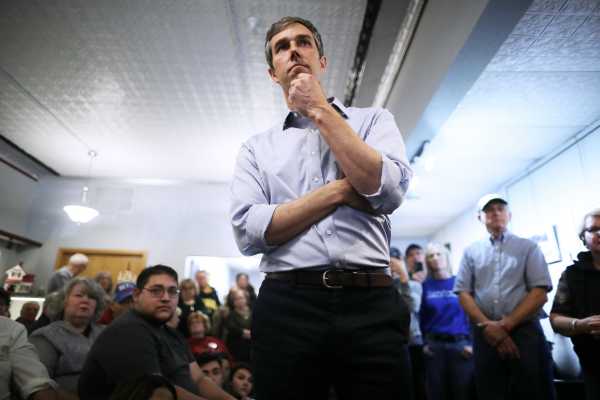
In his early days as a presidential candidate, Beto O’Rourke has walked away from supporting single-payer Medicare-for-all and into the arms of another health care plan: Medicare for America.
That plan, introduced last year by Reps. Rosa DeLauro (D-CT) and Jan Schakowsky (D-IL), was founded on the previous work of the Center for American Progress and Yale professor Jacob Hacker. It is the Democratic establishment’s alternative to the single-payer approach favored by Sen. Bernie Sanders (I-VT) and the democratic socialist left.
It would not move every American into a government health care plan over the next few years, as the Medicare-for-all bill authored by Sanders would. Employer-based insurance, which covers half of all Americans, would be preserved, though workers would have the option of leaving their work plan to join the new Medicare program. Over a long enough timeline, however, Medicare for America would likely cover most and maybe all Americans under a single government plan. The uninsured and people on Medicaid or Obamacare would be moved into the new public coverage right away, and newborns would be enrolled automatically in the plan as well.
O’Rourke has quickly become the bill’s most prominent proponent, citing it on the campaign trail as the best path to universal coverage despite his earlier support for single-payer health care. He is selling it as the more politically palatable solution. From the Texas Tribune:
That Democrats are arguing whether their next health care proposal should cover every American in a government plan in a matter of years or a matter of decades shows how far to the left the party’s internal health care debate has shifted. But in a crowded presidential field, these distinctions are going to be treated as meaningful. O’Rourke is allying himself with more mainstream Democrats, setting up a collision with Sanders and the single-payer purists.
Medicare for America, explained
In brief, here’s what the bill authored by DeLauro and Schakowsky and now embraced by O’Rourke would do:
- The uninsured, people currently purchasing insurance in the Obamacare marketplaces, Medicaid beneficiaries, and newborns would automatically be enrolled into an improved Medicare program, which would continue to cover seniors as well.
- Employers could continue to offer private insurance, so long as it meets certain federal standards. Companies could also elect to send their workers to the public program and pay a contribution toward their employees’ costs. Likewise, workers could voluntarily leave their job’s insurance for the new public plan.
- Participants would be required to pay premiums, on a sliding scale based on their income; people with lower incomes would pay no premium at all. Out-of-pocket costs would also be based on income and capped at $3,500 for an individual or $5,000 for a family.
- Doctors would be paid Medicare rates, with an additional increase provided for primary care doctors and mental health services.
The plan is intentionally written to avoid disrupting employer-sponsored insurance for people who currently get coverage through their work. Companies could continue to offer private insurance to their employees as long as it covers at least 80 percent of health care costs. Businesses could also proactively choose to send their workers into the government plan while contributing money to the program to cover their costs. Employees would have the option of leaving their company plan on their own as well.
The legislation’s proponents believe that moving people into Medicare more gradually, rather than transitioning everyone in just a few years, would weaken any Republican arguments intended to scare seniors into believing that the Medicare they currently rely on is at risk.
“I think it makes sense to go slowly in moving people into Medicare to minimize backlash among those who depend on it already,” Hacker told me during our recent interview. “Disruption is one of the big reasons why an immediate move to a single-payer system is probably a bridge too far in American politics for the foreseeable future.”
So Medicare for America plainly would not eliminate private insurance, as single-payer supporters desire. Not only would it preserve employer-sponsored coverage, it would permit private Medicare Advantage plans (which already provide a private alternative for current Medicare beneficiaries) to compete with the government plan, in part to provide a choice for people.
What about financing, often the trickiest question for a single-payer plan? Medicare for America would start by rolling back the Republican tax cuts. An additional 5 percent tax on income over $500,000 would be applied. Payroll taxes for Medicare would also be hiked, as would the net investment income tax rate. New excise taxes on tobacco, alcohol, and sugary drinks would be introduced. The bill also requires that states continue making payments to the federal government equivalent to what they pay right now for Medicaid’s costs.
Medicare for America is not really single payer. Private insurance is preserved. Most Americans would still have to pay premiums and out-of-pocket costs, which the Sanders Medicare-for-all bill would effectively eliminate. It is far more ambitious than a Medicare buy-in or other public options, but it still falls short of what the Democratic left believes is necessary to fix American health care.
How Medicare for America fits into the 2020 Democratic debate
O’Rourke could prove a useful cipher in determining where the Democratic Party really stands on health care. Almost every Democratic senator running for president has signed onto Sanders’s Medicare-for-all bill. Even though their commitment to the cause might be less than absolute (Sanders aside), that has left little distinction between the candidates on one of the Democratic Party’s biggest issues.
O’Rourke’s embrace of Medicare for America establishes a clearer demarcation — and a sharp contrast with his biggest fundraising rival. He and Sanders have proven themselves to be the most prolific fundraisers of the 2020 field so far.
The former Texas Congress member apparently decided it is better to position himself a little closer to the middle. As Vox’s Sarah Kliff reported last week, O’Rourke had embraced full-throated single-payer ideas in the past but modulated his position recently, saying he’s opting for pragmatism over ideological purity.
“If we become too ideological or too prescribed in the solution, we may allow the perfect to become the enemy of the good,” he told Iowa voters, according to the Texas Tribune. “And there are fellow American human lives depending on us finding a solution.”
For Beto boosters, this could serve as an example of his open-hearted but practical progressivism. For his detractors, it might demonstrate a vacuous candidacy founded more in charisma and vagaries than conviction and a sophisticated policy platform. The question we still don’t know the answer to is what kind of candidate Democratic voters prefer.
I have wondered for some time how many absolutist single-payer acolytes there really are within the Democratic Party. A January poll by the Kaiser Family Foundation found that 81 percent of Democrats support a single-payer Medicare-for-all plan — but support for a plan like Medicare for America, opening government coverage to everyone but allowing people to keep their current plan if they so choose, was a little higher, at 91 percent. Like the rest of the public, Democratic support for single-payer rose when they heard out-of-pocket costs would be eliminated and every American would be guaranteed coverage. But then support fell when they were told it would lead to higher taxes or delays in medical treatment.
Another poll, taken by Democratic pollster Michael Perry, found that just 11 percent of Democrats say they would support only Medicare-for-all, because incremental reforms prop up a broken system. The vast majority — 84 percent — said they support Medicare-for-all and more gradual improvements to the Affordable Care Act. (The polling group didn’t ask about a plan like Medicare for America, unfortunately.)
The point is, the broader Democratic electorate does not seem as firmly committed to single-payer as the energized left. Sanders can make the credible claim that the idea is still on the ascent, having rapidly moved toward the mainstream since his 2016 campaign, and it does already enjoy broad support within the party. But O’Rourke is making a different bet.
In a primary and on an issue where there is so much policy overlap between the candidates, we have now drawn clearer battle lines. O’Rourke vs. Sanders. Medicare-for-all vs. Medicare for America.
Sourse: vox.com






